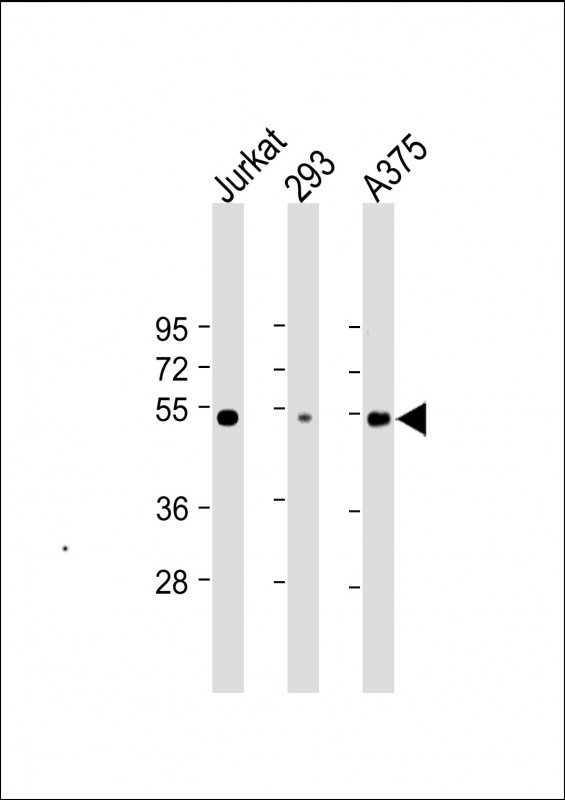
| WB | 1/2000 | Human,Mouse,Rat |
| IF | 咨询技术 | Human,Mouse,Rat |
| IHC | 咨询技术 | Human,Mouse,Rat |
| ICC | 技术咨询 | Human,Mouse,Rat |
| FCM | 咨询技术 | Human,Mouse,Rat |
| Elisa | 咨询技术 | Human,Mouse,Rat |
| Aliases | RanBP-type and C3HC4-type zinc finger-containing protein 1, 6.3.2.-, HBV-associated factor 4, Heme-oxidized IRP2 ubiquitin ligase 1, HOIL-1, Hepatitis B virus X-associated protein 4, RING finger protein 54, Ubiquitin-conjugating enzyme 7-interacting protein 3, RBCK1, C20orf18, RNF54, UBCE7IP3, XAP3, XAP4 |
| Entrez GeneID | 10616 |
| WB Predicted band size | 57.6kDa |
| Host/Isotype | Mouse IgG1 |
| Antibody Type | Primary antibody |
| Storage | Store at 4°C short term. Aliquot and store at -20°C long term. Avoid freeze/thaw cycles. |
| Species Reactivity | Human, Mouse, Rat |
| Immunogen | This RBCK1 (UBCE7IP3) antibody is generated from a mouse immunized with a recombinant protein of human RBCK1 (UBCE7IP3). |
+ +
以下是关于RBCK1(UBCE7IP3)抗体的3篇参考文献,按文献名称、作者和摘要内容概括列出:
1. **"HOIL-1L ubiquitin ligase modulates immune signaling by regulating linear ubiquitination in B cells"**
*Authors: Tokunaga F, et al.*
摘要:研究利用RBCK1抗体(HOIL-1L)通过免疫沉淀和Western blot分析,揭示其在B细胞中调控线性泛素化修饰的作用,参与NF-κB信号通路及炎症反应。
2. **"RBCK1 deficiency leads to autoinflammation and immune dysregulation via impaired ubiquitination"**
*Authors: Boisson B, et al.*
摘要:通过RBCK1抗体检测患者样本中的蛋白表达,发现RBCK1基因缺陷导致泛素化异常,引发自身炎症性疾病,并探讨其与免疫稳态的关系。
3. **"The E3 ligase HOIL-1L regulates cardiac function through linear ubiquitination"**
*Authors: Sasaki K, et al.*
摘要:研究使用RBCK1抗体进行心脏组织免疫组化,证明HOIL-1L(RBCK1)通过线性泛素链调控心肌细胞凋亡和心力衰竭的分子机制。
4. **"RBCK1 is a novel regulator of Wnt/β-catenin signaling in colorectal cancer"**
*Authors: Li Y, et al.*
摘要:通过Western blot和免疫荧光实验(使用RBCK1抗体),揭示RBCK1通过泛素化降解β-catenin抑制结直肠癌进展,提出其作为潜在治疗靶点。
以上文献均直接涉及RBCK1抗体的应用,涵盖泛素化机制、免疫调控及疾病模型研究。
The RBCK1 (RANBP2-type and C3HC4-type zinc finger-containing protein 1), also known as UBCE7IP3 or HOIL-1L-interacting protein, is a multifunctional protein involved in ubiquitination, immune regulation, and cellular stress responses. As a component of the linear ubiquitin chain assembly complex (LUBAC), RBCK1 plays a critical role in the NF-κB signaling pathway by catalyzing the formation of linear polyubiquitin chains on target proteins, modulating inflammatory and immune processes. It contains a RING-finger domain, enabling E3 ubiquitin ligase activity, and interacts with other LUBAC components like HOIP and SHARPIN. Dysregulation of RBCK1 has been linked to autoimmune disorders, chronic inflammation, and certain cancers.
Antibodies targeting RBCK1 are essential tools for studying its expression, localization, and molecular interactions. They are widely used in techniques such as Western blotting, immunoprecipitation, and immunofluorescence to investigate its role in ubiquitin-dependent signaling, DNA damage repair, and apoptosis. Specific RBCK1 antibodies help identify post-translational modifications, protein-protein interactions, and disease-associated mutations (e.g., polyglucosan body myopathy type 2). Researchers also utilize these antibodies to explore RBCK1's involvement in pathological conditions, including cardiomyopathies and neurodegenerative diseases. Validation of antibody specificity is crucial due to potential cross-reactivity with homologous proteins or isoforms.
×